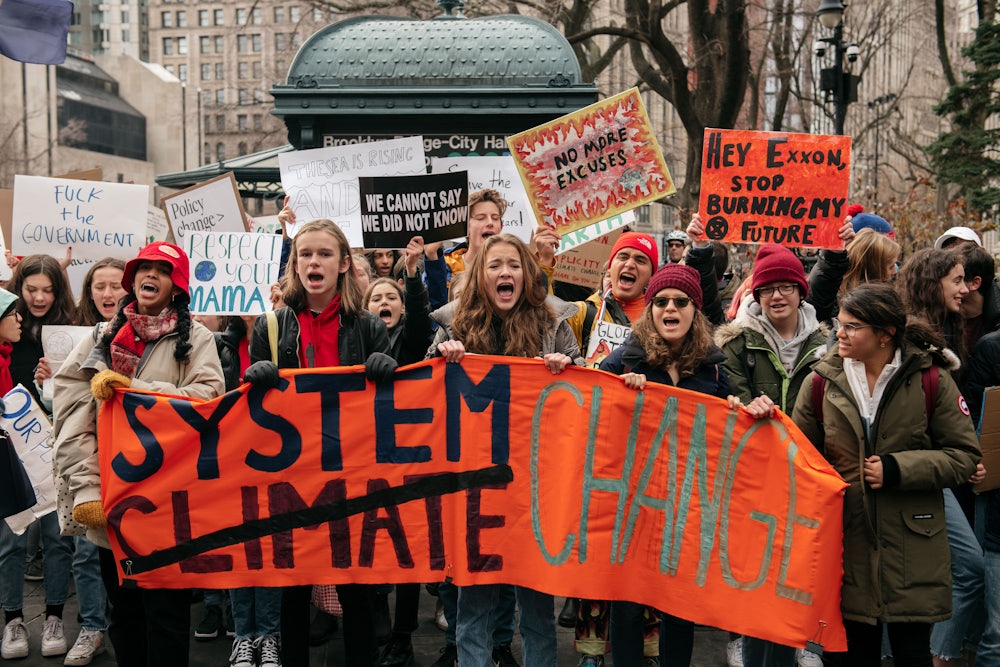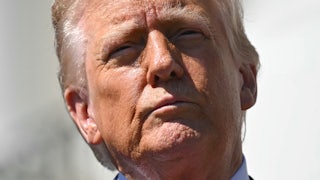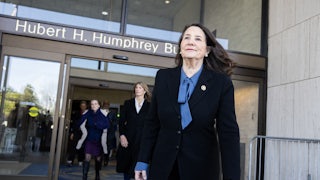The youth vote is one of the biggest what-ifs in American politics. The crucial 18-to-29 bracket typically doesn’t participate at levels comparable to groups over the age of 30, skewing national electoral profiles toward the older end of the spectrum. The 2020 election didn’t upend the trend, but surging youth turnout did send a crucial message to the Democratic Party, particularly on the issue of climate change: We care; now do something.
The youth vote jumped roughly 10 percent between the 2016 election and the 2020 election, per a study published last month by the Center for Information and Research on Civic Learning and Engagement at Tufts University. (For context, the same age group’s participation increased by just 1.1 percent between 2012 and 2016.) Climate change wasn’t the only issue at the front of young voters’ minds—the Tufts study reported that Covid-19 and “combating violence against people of color” were top motivating factors for them last November. But as evidenced by the work of groups like the youth and climate-oriented Sunrise Movement, climate can become independently motivating for young voters and also a connecting point to other issues. As Saad Amer, director of the youth voter mobilization organization Plus1Vote, told InsideClimateNews in November, “Climate is a mobilizing issue because climate is an intersectional issue,” inextricably tied to racial justice and health equity.
The Biden administration has numerous options to cement the Democratic lead with young voters and motivate them to vote ahead of the 2022 midterms and the 2024 presidential election. Canceling the Keystone XL pipeline was a solid start. But this administration needs to do more than reward the youth climate movement with opening-month executive orders. Sooner or later, the administration is going to stumble on climate policy. One way to ensure that young voters don’t disengage when this happens—and the best way to ensure it doesn’t stumble in the first place—is to formally establish a version of a federal youth climate council.
Young climate activists are already clamoring for this sort of formal role in policymaking. It’s not an unreasonable request. The models for such councils exist within modern sovereign governments and the broader climate movement already. The government of the Confederated Tribes of Siletz Indians established the Siletz Tribal Youth Council, which has joined other groups like Latino Unidos Siempre to push Oregon state legislators to proactively pursue a just transition from fossil fuels. Just last week, the Standing Rock Youth Council organized a 93-mile run in freezing temperatures in an attempt to bring publicity to its long-standing call for the Biden administration to cancel the Dakota Access Pipeline—arguably the extractive project most responsible for activating the current generation of young environmentalists and Indigenous rights organizers.
Groups like these and Sunrise have focused on advocating for solutions, but often they are forced to interact with federal officials adversarially rather than cooperatively due to inaction on the part of elected officials. At an event held by the aforementioned Oregon groups, 17-year-old Rhylie Woodley admitted they were already frustrated entering the voting field because “the science showing global warming is caused by burning fossil fuels has been known for more than 30 years, over twice my lifetime.” Adding injury to that insult, Woodley’s generation will be more affected than any yet by the effects of global warming.
The federal government could establish a council or advisory group similar to the United Nations’ Youth Advisory Group on Climate Change—a suggestion made by 18-year-old climate activist Sophia Kianni in a recent article by Climate Tracker that explored the possibilities of a federal youth climate group. In the best-case scenario, this group would likely function in a consulting role, advising the administration on policy as it was being formed in its early stages. If established thoughtfully, i.e., with a diverse group that isn’t hand-picked for its friendliness and actually has its ideas considered and adopted by federal agencies, then the White House could make the case to young voters in four years that, unlike previous administrations, it’s willing to go beyond mere “listening” to engage with their cohort.
All too often, young people organize for a campaign only to be sidelined by the resulting administration. Having a council of climate-focused youth organizers and activists who met regularly with administration officials would go a long way toward ensuring that the president’s office is held accountable for campaign promises to young climate voters. And it’s sound political strategy, too: The Democratic Party could reap the benefits of having well-organized, experienced get-out-the-youth-vote groups on its side.
As with any federal advisory group or council, the quality and output of such a body would depend entirely on the powers granted to it by the administration and who was tapped to fill its seats. That means a youth climate council could just as easily become a symbol of further paternalistic, top-down politics, if the White House decided that it simply wanted to placate the call for engagement and nothing more. But even that would be an improvement over the status quo: Right now, discussing a possible youth council is a hypothetical exercise, as the White House has not signaled whether it’s even open to the proposal. In a statement to Climate Tracker, the administration said only that it, “feels that youth climate activists will play an important role in tackling the climate crisis,” which itself feels a tad too close to a pat on the head.
Ultimately, though, the case for youth engagement on climate change is not one of trying to game electoral politics for short-term gains. It’s one of moral necessity. The truth is that Biden’s generation of politicians passed the buck on taking sufficient climate actions and now, in its last chapter, is trying to right that wrong. To think the same elected officials who enabled and exacerbated the issue can be trusted to single-handedly produce solutions, as opposed to the generations whose lives will forever be shaped and defined by that failure, is to fall into the same trap that got us here. Establishing a youth council to advise the Biden administration on climate and other policy matters is good politics and probably good policy, as well—but it’s also simply the right thing to do.








